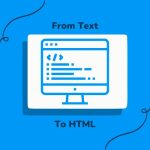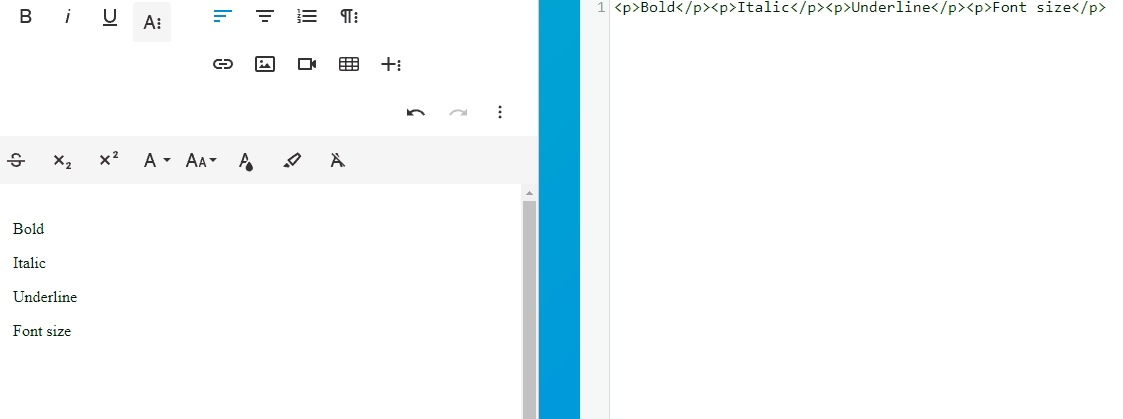From Text to HTML: Create Engaging Web Content with Froala
- Posted on
- By Justin Imperial
- In General,
Table of contents
- Text to HTML with Ease
- Comparison Between WYSIWYG editors, Source Code Editors and Hybrid Editors
- WYSIWYG vs Source Code vs Hybrid Editors
- WYSIWYG editors:
- Pros
- Cons
- Source code editors:
- Pros
- Cons
- Hybrid editors:
- Pros
- Cons
- Froala - The WYSIWYG HTML Editor that Creates Efficient Web Content
- Froala and ChatGPT
- Web Content Creation Has Never Been Easier with Froala HTML Editor

Text to HTML with Ease
Even though it’s relatively easy, it’s still sometimes tiring having to convert text into HTML code isn’t it? And sometimes we just wish we want something that will help us do this redundant and boring task for us so we can focus on thinking of new ideas and creating content with those ideas.
Well, good thing there are txt to HTML editors that do just that. These are software tools that help developers convert plain text into HTML code without having to do it manually. It’s a very powerful and helps users quickly format web content without having to know the complex syntax of HTML code. Instead, users can just type text just as they would with a word processor such as Microsoft Word or Google Docs into the editor and voila! The software automagically generates the corresponding HTML code without extensive work on your end.
One of the big benefits of using a text to HTML editor is that it saves the user a lot of time as well as effort. Because, the software eliminates the need to manually write the HTML code. This is particularly helpful for new developers who need to quickly create web pages or email templates. Additionally, text to HTML editors usually offer a wide range of features and customization options like syntax highlighting, auto-completion, code validation, intuitive user-interface, and many more. With these features, the development process is less of a hassle, more enjoyable, and more streamlined.
Comparison Between WYSIWYG editors, Source Code Editors and Hybrid Editors
Editors come in many different ways, with each having its own features, advantages and limitations. Three common types of editors include WYSIWYG editors, source code editors, and hybrid editors.
WYSIWYG vs Source Code vs Hybrid Editors
Here’s a comparison between the three types of editors.
WYSIWYG editors:
WYSIWYG (What You See Is What You Get) editors give users the power to create content without the hassle of typing out code. They mostly are created for the ease of use so they usually have a user-friendly interface that resembles a word processor. This gives users the power to format text, insert images, insert videos, add links, add tables and more. And the best of all, you do it much how you do it with a word processor. So if you know how to use Microsoft Word, then you know how to use these editors! However, due to its code being automated, the code could potentially by bloated and messy. This could affect the website’s performance and make it slow.
- Allows users to create web content visually, without needing to write code manually
- Offers a user-friendly interface, making it easy to create content
- Can generate bloated and messy code, which affects website performance
Pros |
Cons |
|
|
Source code editors:
Source code editors, on the other hand, are for developers who like to do things the traditional way. Back then, there were no fancy WYSIWYG editors and every developer painstakingly typed every code manually. So you could say, the best coders use these. But nowadays, these editors too, have vastly improved. They have a lot of features that increase productivity and optimize the coding process. Moreover, a lot of them usually have syntax highlighting, auto-complete, and many more specific features to improve your development process. No longer do developers have to do everything manually by themselves. The hassle of debugging without automated assistance is a pain and could take hours. So even though, these types of editors can be the most challenging out of the three for non-technical people, they have vastly improved to assist developers create beautiful and professional web pages.
- Designed for developers who prefer to work with code directly
- Offer syntax highlighting, auto-completion, and other features that helps developers write clean and efficient HTML code
- Can be challenging for non-technical users who are not familiar with the proper syntax
Pros |
Cons |
|
|
Hybrid editors:
And lastly, hybrid editors combine both the benefits of a WYSIWYG and source code editors. They have both visual and code interface modes. These allows users to switch between the two making it very flexible. Not only will they get the benefit of automated code, but they can also fix the bloated code or just customize the code that the software has generated.
- Combines the benefits of both WYSIWYG and source code editors, allowing users to switch between visual and code modes as needed
- Offers a flexible and intuitive workflow that can benefit both developers and non-technical users
- Each type of text to HTML editor has its own set of advantages and limitations. WYSIWYG editors are a good choice for non-technical users. Source code editors are ideal for advanced developers who want more control. Hybrid editors offer the best of both worlds, providing a flexible and intuitive workflow that can benefit both developers and non-technical users.
Pros |
Cons |
|
|
Froala – The WYSIWYG HTML Editor that Creates Efficient Web Content
Froala is a WYSIWYG HTML editor that easily converts text to HTML code. It offers a ton of features especially when paired with our numerous plugins. Users are able to create and edit HTML content without needing to write any code from scratch. Some features are its intuitive user-interface, drag-and-drop, support for various file types, videos, tables and many more. Additionally, its responsive design ensures that the content you write looks amazing on any platform or device. May it be phone, desktop, tablet, iOS, Android, Windows or Linux. Froala is an excellent choice for developers who want to write high-quality web content quickly and with ease.
Froala and ChatGPT
The great thing about Froala is it easily integrates with many frameworks and languages. One thing that you could integrate Froala with is ChatGPT, a language model trained on vast information from the internet. With ChatGPT, users can generate high-quality content based on the prompt of the user. ChatGPT can integrate with Froala so users can harness the powerful AI directly through Froala itself. This integration will help users create compelling content quickly and easily.
Web Content Creation Has Never Been Easier with Froala HTML Editor
In summary, text-to-HTML editors are amazing tools that helps developers and beginner developers create web content. WYSIWYG editors, focus on generated code without needing to moanually type it. Meanwhile, source code editors focus on letting the developers type the code while assisting them with features such as syntax highlighting. And lastly, hybrid editors combine both editors.
Froala is a powerful text-to-HTML editor which can integrate with ChatGPT to help users generate compelling content and give users new ideas. With the power of both, users can create web content with ease. Additionally, with its intuitive interface, robust feature set, and the power of ChatGPT, Froala is sure to become an essential tool for all your web content creation needs.
Justin Imperial
Justin is a web developer, writer, graphic designer and everything in between! He loves technology, philosophy, astronomy and more. He loves learning new thins and his curiosity is insatiable. On his free time, you can find him isolating himself while reading a book or playing video games or out with his friends.
-
Hide Show







No comment yet, add your voice below!